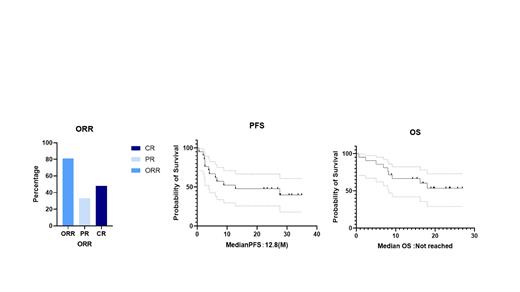Background
Relapsed or refractory (R/R) diffuse large B-cell lymphoma (DLBCL) shows poor clinical outcomes. Anti-CD19 chimeric antigen receptor-T cells (CAR-T) therapy is emerging as the second-line therapy of choice, but in real-world studies its efficacy and long term follow is not promising. Effective bridging therapy can reduce tumor burden and improve CAR-T efficacy. Zanubrutinib, a selective Bruton tyrosine kinase (BTK) inhibitors, combined regimens have established therapeutic activity by targeting B-cell receptor signaling and have individually shown efficacy in patients with R/R DLBCL. Thus, the present study evaluated the efficacy and safety of zanubrutinib-combined regimen as bridging treatment in CD19 CAR-T therapy.
Methods
This retrospective study includes all patients participant in the clinical trail (NCT 02537977) between January 2020 and December 2022. All 21 heavily treated patients with r/r DLBCL who received zanubrutinib-combined regimens as bridging therapy are included. Patient clinical characteristics were collected upon patient enrollment. Efficacy outcomes included overall response rate (ORR), progression-free survival (PFS), and overall survival (OS), whereas safety outcomes included incidence of adverse events. The zanubrutinib combined regimens are zanubrutinib with IMIDs, chemotherapy and/or rituximab.
Results: Of the 21 evaluable patients, median age of patients is 57 year old and median treatment line is 3. 19 patients (90%) are non-GCB subtype and 18 patients(86%) are IPI score >3. 14 patients(67%) are double expression and 7 patients (33%) have TP53 mutation. Objective response rate(ORR) is 81%; of whom, 10 patients(48%) got complete remission(CR) and 7 patients(33%) got partial remission(PR). With a median follow-up of 25 months, the median PFS was 12.8 months and median OS was not yet reached. 8 CR patients and 3 PR patients maintain long-term remission and are still under followup. 18 patients (86%) has grade 1-2 cytokines release syndrome(CRS) and 3 patients(14%) has grade 1 immune effector cell-associated neurotoxicity syndrome (ICANS). No severe CRS and >1 grade ICANS were observed. The most common hematologic toxicities included grade ≥3 neutropenia (90%) and grade 3/4 thrombocytopenia (71%). No patients had grade ≥3 non hematologic toxicities.
Conclusion:
Zanubrutinib-combined regimens are effective and safe as bridging therapy in CD19 CAR-T therapy. More prospective studies are further command.
OffLabel Disclosure:
No relevant conflicts of interest to declare.
Zanubrutinib


This feature is available to Subscribers Only
Sign In or Create an Account Close Modal